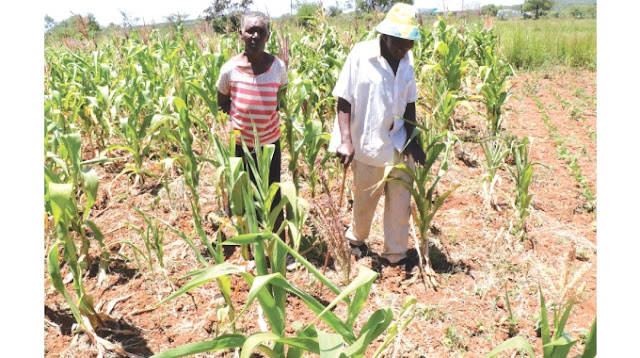ANXIETY has gripped farmers in Matabeleland and Midlands provinces following a prolonged dry spell, which is threatening to cripple this year’s harvest as crops have started wilting due to moisture stress.
Despite projections of a normal to above normal rainfall in
both the first and second-half of the 2021/2022 cropping season, farmers now
fear for the worst should the dry spell persist beyond this week.
The dry spell, which has persisted for about three weeks in
some parts of the country has caused moisture stress on crops, which are mostly
at vegetative stage, which is the most critical when crops require enough water
to mature.
Over 2,5 million hectares had been put under cropping
nationally by February 1 with 1 563 200 hectares of maize planted.
With only a month left before the normal rain season comes
to an end, agronomists have warned that if the dry spell continues, the current
crop is likely to be declared a complete write off.
A Chronicle news crew yesterday visited selected peri-urban
farms in Umguza District in Matabeleland North, parts of Matabeleland South and
Midlands where it observed that maize at tasseling and grain filling stage had
been severely affected with most of the crop showing signs of wilting.
Mr Isaac Phiri and his wife Mrs Sibongile Phiri tour their
wilting maize crop in Hope Fountain, Umguza District yesterday
Some farmers who planted sugar beans said the crop was now
under threat from cutworms.
Mr Isaac Phiri, a farmer at Hope Fountain in Umguza
District said: “This is now scary because the rains have disappeared and my
fear is that my crops will be a write off.
“I managed to put two hectares of maize under
Pfumvudza/Intwasa Programme and all along I was hopeful that I would be able to
deliver at least 20 bags to GMB.”
Another farmer from the same area, Ms Maggie Sibanda, a
widow, said: “My crops have started wilting because of the dry spell. I started
very well, but from the look of things we are doomed as the prolonged dry spell
is beginning to take its toll on my crops.”
Ms Sibanda said she had managed to earn a good harvest from
the last season due to good rains.
Mr David Sibanda of Mahatshula suburb said the season had
begun well and was promising but now all hope was fading away.
Matabeleland North provincial agronomist Ms Zenzele Ndlovu,
however, said some crops could be saved if rains come now.
“Without the rains farmers are in extreme danger. From our
crop assessment, we also observed that small grains, which had initially been
enduring drought have started wilting,” she said.
“If the dry spell continues it means there will be a
reduction in yield, which will be a great loss to the farmer. Some of the crops
that we hoped would soon be harvested have started wilting.”
Ms Ndlovu said supplementary irrigation was the only option
in the wake of poor rains.
“Without the rain, nothing will come out from the fields
except for farmers irrigating their crops. Our worst fear is that if it doesn’t
rain next week, we are likely to encounter disaster,” she said.
Ms Ndlovu said farmers have also been affected by the outbreak
of fall armyworm, which increases in dry times. She said the ministry was
currently conducting a livestock and crop assessment exercise in the province
and the results will be out at the beginning of March.
Ms Sithembile Ndlovu, an agricultural extension officer in
Umguza, said farmers in her district were also affected by their failure to
make early land preparation.
“We advised farmers to mulch their fields in the event of
erratic rains to avoid evaporation, but sadly this area doesn’t have enough
pastures and all the grass is depleting,” she said.
In Matabeleland South Province, crops under Intwasa/
Pfumvudza programme are in a fair condition with farmers still optimistic of a
good harvest. Government adopted Intwasa/Pfumvudza to address the problem of
low production and productivity, which continued to negatively affect food
security in Zimbabwe.
The concept promotes climate proofing agriculture by
adopting conservation farming techniques and involves the utilisation of small
pieces of land and application of the correct agronomic practices for higher
returns. Chronicle









0 comments:
Post a Comment